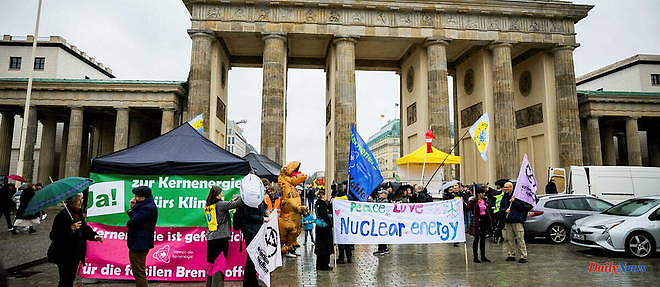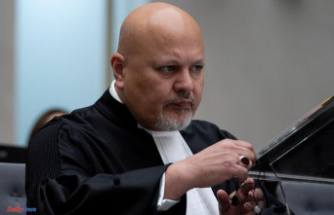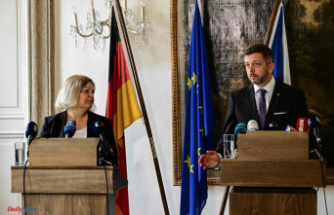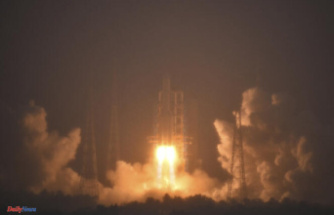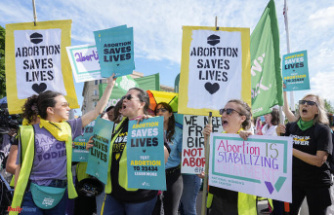"I would have liked us to really celebrate after all these years of struggle", regrets, a little disappointed, this retired teacher who has been campaigning for the exit from nuclear power for forty years. But she refuses that the little icy rain and the lack of resonance of the demonstration organized by Greenpeace in front of the Brandenburg Gate do not spoil this long-awaited historic moment. She recovers quickly, "Never mind. It's such a relief. Now that all the power stations are disconnected, we are finally safe in Germany. But there remains the problem of waste. We still don't know what to do with it. »
On Pariserplatz, east of the Brandenburg Gate and – ironically – under the windows of the French Embassy, the yellow papier-mâché dragon erected there by nuclear opponents is visibly softening under the rain. The nuclear dragon is lying on its back, the four irons in the air. Perched on her stomach, the little red sun "Nuclear Power." No thanks ! », mascot of the powerful German anti-nuclear movement, triumphs. He slew the beast. The last three nuclear power plants still in operation in Germany will be disconnected before midnight this Saturday evening, ending more than forty years of debate.
Because after the enthusiasm of the 1970s, when the first reactors came into operation and the leaders in power praised this cutting-edge technology, synonymous with progress, the Germans were quickly disillusioned. The dispute arose very quickly. Opposition to nuclear power is the founding party of the Greens. It affects all layers of society even in conservative bourgeois circles. It was the red-green government of Gerhard Schröder which, in 2001, voted to phase out nuclear power. Back in power, the conservatives of the CDU backtracked in 2010. But a few months later, a new about-face after the Fukushima accident. Angela Merkel announces the abandonment of nuclear power. It was endorsed in 2011 by the Bundestag. Twelve years later, it's done.
On the dangers of nuclear power, everyone has their own series of catastrophic stories. "Harrisburg, Chernobyl, Fukushima," the retired teacher lists. And, today, the fear as soon as the fighting approaches the Zaporizhia power plant in Ukraine… What else do we need to prove the dangers of this technology? How many deaths, how many miscarriages, how many cancers…” She also remembers the Chernobyl trauma. Mushrooms and wild boars still contaminated in Bavaria. For her, the French are extraterrestrials and President Macron, who claims the "nuclear renaissance", is "irresponsible". Is Germany going it alone in Europe? "Absolutely not," protests Heinz Smital. Austria never connected its reactors, which were nevertheless ready to enter service. Italy has already disconnected four. Belgium stop. »
On the west side of the Brandenburg Gate, nuclear supporters organized their party around the opposite slogan: "Nuclear? Yes please ! They are slightly outnumbered, have brought a booming sound system, and are waving "Peace, love, nuclear energy" banners. It was the pro-atom association Nuklearia which called for this counter-demonstration. Myrto Tripathi, French and president of Replanet France, criticizes the Germans for their "selfishness": "They exploit the network of others, either by importing electricity when they do not have enough, or by exporting it when they have it. too much, at the risk of creating a blackout by overloading the network of their neighbours. The Czech Republic was forced to install huge equipment at its borders to block German electricity. It destabilized the Czech network. It is however imperative that the Germans start playing European solidarity! But the energy sovereignty of Europe, independent of the United States or China, goes through nuclear power. It is our best tool for the climate. »
Eike Düwelshött, civil engineer, is worried. "I never had a clear idea on this question. But for two years, I began to study the problem and I understood that we plunged into the void. There is no concept behind the “energy transition” project. We disconnect the power plants without having foreseen a reliable alternative and we make ourselves dependent on foreign countries. At first, I dared not share my doubts with my friends. The anti-nuclear consensus was so strong in Germany. But since the war in Ukraine, the end of Russian gas and the rise in household electricity bills, more than half of Germans would have liked the life of the last power stations to be extended to provide a safety valve. Some would even like all the power stations to be put back into service.

